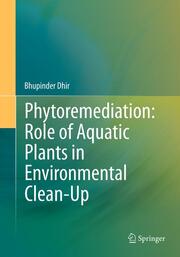Phytoremediation: Role of Aquatic Plants in Environmental Clean-Up von Bhupinder Dhir
Phytoremediation: Role of Aquatic Plants in Environmental Clean-Up
ISBN/EAN: 9788132228882
Sprache: Englisch
Umfang: x, 111 S., 15 s/w Illustr., 5 farbige Illustr., 11
Einband: kartoniertes Buch
Erschienen am
27.08.2016
Auf Wunschliste
Contamination of the different components of environment through industrial and anthropogenic activities have guided new eras of research. This has lead to development of strategies/methodologies to curtail/minimize environmental contamination. Research studies conducted all over the globe established that bioremediation play a promising role in minimizing environmental contamination. In the last decade, phytoremediation studies have been conducted on a vast scale. Initial research in this scenario focused on screening terrestrial plant species that remove contaminants from soil and air. Later, scientific community realized that water is a basic necessity for sustaining life on earth and quality of which is getting deteriorated day by day. This initiated studies on phytoremediation using aquatic plants. Role of aquatic plant species in cleaning water bodies was also explored. Many of the aquatic plant species showed potential to treat domestic, municipal and industrial wastewaters and hence their use in constructed wetlands for treating wastewaters was emphasized. The present book contains five chapters. First two chapters provide information about types of contaminants commonly reported in wastewaters and enlists some important and well studied aquatic plant species known for their potential to remove various contaminants from wastewater. Subsequent chapters deal with mechanisms involved in contaminant removal by aquatic plant species, and also provide detailed information about role of aquatic plant species in wetlands. Potential of constructed wetlands in cleaning domestic and industrial wastewaters has also been discussed in detail. The strategy for enhancing phytoremediation capacity of plants by different means and effectiveness of phytoremediation technology in terms of monitory benefits has been discussed in last chapter. Last chapter also emphasizes the future aspects of this technology.
Dr. Bhupinder Dhir, has been working as a Scientist at University of Delhi South Campus, India, since last five years. Her academic background is related to botany. Main research interests are in subject areas such as Plant Physiology, Stress Physiology, Ecology and Environment. The main focus of her research is on environmental stress responses in plants and development of strategies for developing eco-friendly wastewater technology by using aquatic plant biomass. Strong research background in the relevant area provides her a specialization and expertise in the development of phytoremediation technology. The quality of research is reflected in research articles published in journals of national and international repute. She has 22 research publications to her credit.






